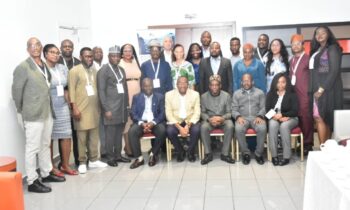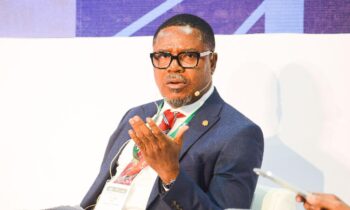
In keeping with Nigeria’s leadership role in the development of Local Content in Africa, the Nigerian Content Development and Monitoring Board (NCDMB) has concluded a two-day Local Content development experience-sharing session with a delegation from Mozambique’s national oil company, Empresa Nacional de Hidrocarbonetos (ENH).
The engagement was held on the sidelines of the 8th Sub-Saharan Africa International Petroleum Exhibition & Conference, in Lagos.
NCDMB’s delegation was led by the Executive Secretary, Engr. Felix Omatsola Ogbe, while Mozambique’s team was led by the Chairman of Empresa Nacional de Hidrocarbonetos, Mr. Estevao Rafeal Pale.
The experience-sharing session was facilitated by Aberdeen Global Strategies & Solutions, under the leadership of Dr. Mark Osa Igiehon, who consults for ENH Mozambique.
In his introductory comments, the Executive Secretary conveyed NCDMB’s commitment to supporting African oil-producing nations in developing and implementing local content policies as a strategy for improving indigenous participation and value optimization from hydrocarbons and mineral resources.
He lauded the giant strides recorded by Mozambique in its gas sector and advised against repeating the mistakes made by Nigeria in the early years of its oil and gas industry.
Represented by the Director of Monitoring and Evaluation, NCDMB, Mr. Abdulmalik Halilu, the Executive Secretary explained that every oil and gas-producing nation must choose to either focus on optimizing revenue generation or maximizing in-country value from the activities of the industry.
He stated that the revenue generation option encourages oil and gas operators to seek the cheapest and fastest route to first oil, while the Government collects maximum revenue in the form of taxes and royalties for development and pays little attention to value addition from industry operations.
He explained that the alternative option focuses on maximizing in-country value and promoting the development and use of local capacities. This model obligates operators in the industry to consider long-term value, while the Government takes lower revenue in exchange for higher in-country value and pays greater attention to life-cycle support for operators.
Speaking further, the NCDMB boss listed key parameters that are critical to in-country value addition and growth of the oil and gas sector on a sustainable basis.
These factors are Regulatory Framework, Gap Analysis, Capacity Building, Funding and Incentives, Research and Development, and Access to Market.
He hinted that a Local Content policy backed with appropriate legislation is very fundamental in local content practice, adding that baseline and periodic gap analyses are essential to determine gaps that need to be closed in the areas of skills, facilities and infrastructure.
He also stressed the need to develop in-country capacities and capabilities and utilise them through oil and gas projects.
The knowledge-sharing programme also featured a presentation on Funds and Funding of NCDMB, delivered by the Director of Finance and Personnel Management, NCDMB, Dr. Obinna Ofili.
The Director was represented by the Head, Credit Analysis and Risk Management, Mrs. Chika Enwerem–Okidi, and underlined the need for dedicated funding that would be applied to developing local content in the oil sector.
The Director mentioned that the Nigerian Content Development Fund (NCDF) is provided for in section 104 of the Nigerian Oil and Gas Industry Content Development (NOGICD) Act and is contributed by 1% of every contract awarded in the upstream section of the oil and gas industry.
He added that the NCDF has been deployed in several successful projects, including the building of human and material capacities, the $350 million Nigerian Content Intervention Fund, the ongoing development of the Nigerian Oil and Gas Parks Scheme (NOGAPS), the construction of the NCDMB 17-story corporate headquarters, and 3rd party investments, many of which created jobs for Nigerians and yield interest for the Board.
The second day of the knowledge-sharing programme featured presentations on the operating framework for planning, research and statistics, capacity building, projects certification and authorization and monitoring and evaluation.
The Director of Projects Certification and Authorization, Engr. Abayomi Bamidele highlighted NCDMB’s role in the award of contracts for oil and gas projects and how opportunities are captured for the local economy, using the Nigerian Content Plan and the Contracting Strategy submitted by operating companies for the Board’s review and approval.
He underlined that local content should be promoted as a national agenda for every country and the right data must be collected to establish current realities and gaps to the target.
He emphasised the need for in-country capacity building based on areas of strengths and weaknesses as well as continuous projects to keep the developed capacities engaged.
The knowledge-sharing programme was very interactive and the Mozambican officials sought clarifications on the Board’s model of enforcing Local Content Compliance, monitoring projects, supervising third-party investments, and many other areas.
The programme was convened in line with the Sectorial and Regional Market Linkage Pillar of the Nigerian Content 10-year strategic roadmap. The roadmap requires NCDMB to support other African oil-producing countries and to develop new markets and partnership opportunities for the benefit of competent Nigerian operating and oil service companies.
NCDMB has provided similar guidance to numerous African nations, including Senegal, Tanzania, and Uganda.





